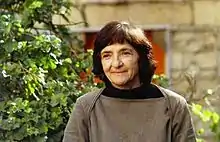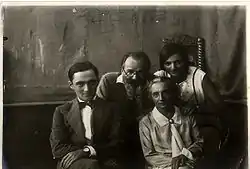Zahara Schatz
Zahara Schatz (Hebrew: זהרה ש"ץ; 1916–1999), was an Israeli artist and designer.[1][2] She was the daughter of Boris Schatz, who founded the Bezalel Academy of Art and Design in Jerusalem. She was best known for the six-branched menorah she designed for the entrance to the Yad Vashem, Israel's official memorial to the victims of the Holocaust.[3]
Zahara Schatz | |
|---|---|
זהרה ש"ץ | |
 | |
| Born | Zohara Schatz July 20, 1916 |
| Died | August 4, 1999 (aged 83) Jerusalem, Israel |
| Nationality | Israeli |
| Other names | Zohara Sandow, Zahara Sandow, Zahara Schatz Sandow |
| Education | École nationale supérieure des arts décoratifs, Académie de la Grande Chaumière |
| Occupation(s) | Artist, craftsperson, designer |
| Known for | Painting, sculpture, plastic arts |
| Movement | Israeli art |
| Spouse | Elliott Franz Sandow |
| Parent |
|
Biography


Zahara Schatz (later Sandow) was born in Jerusalem, then part of the Ottoman Empire.[4] Her father was Boris Schatz and her brother was Bezalel or "Lilik."[5]Her mother was Olga Pevzner, a writer and art history teacher.[6]
She studied at the École nationale supérieure des arts décoratifs (English: National School of Decorative Arts) in Paris from 1934 to 1937.[7] As well as classes at Académie de la Grande Chaumière.[2]
The Schatz children were both artists. They abandoned their father's predilection for Romantic Classicism and his search for a Jewish Eretz Israel-style in favor of a European-American modernism.[8] However Zahara followed her father's dualism: the pursuit of both fine art and crafts (or design).
Art career
After graduation Schatz moved to the United States, settling in California.[7] She married American sculptor Elliott Franz Sandow (1910–1976).[7][9] In the 1940s Schatz taught art classes at the California Labor School in Berkeley.[7] She started working in plastic in the 1940s, designing and building acrylic lamps.[7]
Schatz was part of the Big Sur artists'/writers' colony that included San Francisco sculptor Benny Bufano, author Henry Miller, her sister-in-law Louise Schatz, and her brother Bezalel Schatz. She lived in Berkeley, California, where she was close with courtroom sketch artist Rosalie Ritz, her husband Erwin Ritz and their daughter, publisher and managing editor of The Environmentalist, Janet Ritz.
Schatz exhibited in the U.S. and Europe. In 1951, Schatz won an award for the Table Lamp Model No. T-4-S, at the Museum of Modern Art (MoMA) in New York City.[7] Her winning table lamp design was manufactured by the Heifez Company, the sponsor of the MoMA competition.[7][10]
In 1951, she returned to Israel, however she maintained a residency in Berkeley, California up until the 1970s.[7]
In 1951, Zahara Schatz, Bezalel Schatz, and her sister-in-law Louise Schatz formed a craft workshop called "Yaad" in Israel.[11][7]The workshop produced and marketed products with an Israeli character inspired by the blend of local cultures in Israel.[12]
In 1959, she participated in the Venice Biennale of 1959 and designed the gate, built at the Bezalel Academy for Art and Design for the President's House.
She worked as an adviser on industrial design at the Ministry of Commerce and Industry for Israel.[13][14]
Schatz died of a long illness in Jerusalem on August 4, 1999, at the age of 83.[3]
Awards and recognition
- 1951: award for a table lamp design, Table Lamp Model No. T-4-S, "Low-Cost Lighting Competition/Exhibition", the Museum of Modern Art, New York City, New York[7]
- 1955: Israel Prize, for the Fine Arts Award[15][16]
- 1954: medal of honor, Milan Triennial (Triennale di Milano)
- 1959: Dizengoff Prize for Sculpture[17]
- 1959: participation in the Venice Biennale
- 1960: Yad Vashem Prize, for a six-branch candelabrum
- 1991: Shoshanna Ish-Shalom Prize, Jerusalem
Exhibitions
- "Zahara Schatz: A Retrospective. The Third Exhibition in the Schatz House Series, celebrating 100 Years of Israeli Art," The Artists' House, Jerusalem, 2006.
References
- "Zahara Schatz". Israel Art Guide. Retrieved 3 June 2013.
- Who Was Who in American Art 1564-1975: 400 Years of Artists in America. Sound View Press. 1999. p. 2915. ISBN 978-0-932087-55-3.
- "Obituaries". Los Angeles Times. 1999-08-05. Retrieved 2022-07-31.
- Angelica Schatz
- Ronnen, Meir (June 8, 2006). "The finest Schatz of all". The Jerusalem Post. Retrieved 2022-07-31.
- Boris Schatz: The Father of Israeli Art, Yigal Zalmona, The Israel Museum, 2006, p.7
- Schleuning, Sarah; Strauss, Cindi; Horne, Sarah; MacLeod, Martha; Perkins, Berry Lowden (2021). Electrifying Design: A Century of Lighting. Yale University Press. p. 192. ISBN 978-0-300-25457-0.
- Gilerman, Dana (January 5, 2006). "Prof. Schatz's Wayward Children". Haaretz. Retrieved 2022-07-31.
- Hughes, Edan Milton (2002). Artists in California, 1786-1940: L-Z. Crocker Art Museum. p. 976. ISBN 978-1-884038-08-2.
- Heyne, Carl J. (1960). Art for Young America. C.A. Bennett Company. p. 251.
- "Bezalel Schatz". FAMSF Search the Collections. 2018-09-21. Retrieved 2022-07-31.
- Information Center for Israeli Art: Zahara Schatz
- שבוע אמנות ישראל: פסטיבל ישראל, ירושלים 89, תיאטרון ירושלים, 2־10 ביוני 1989 [Israel Art Week: Israel Festival, Jerusalem 89, Jerusalem Theater, June 2–10, 1989] (in Hebrew). חברת תמון. 1989.
- Industrial Design. Vol. 7. Design Publications. 1960. p. 66.
- "Israel Prize recipients in 1955 (in Hebrew)". cms.education.gov.il (Israel Prize official website). Archived from the original on June 12, 2012.
- Israel Digest: A Bi-weekly Summary of News from Israel. Vol. 6–8. Israel Office of Information. 1955. p. 3.
- "List of Dizengoff Prize laureates" (PDF) (in Hebrew). Tel Aviv Municipality. Archived from the original (PDF) on 2007-12-17.
Further reading
- Eva Elisa Wardi (2005). "The poet of light, Zahara Schatz," documentary film, Jerusalem: Israel Museum, The Gabriel Scherover Information Center of Israeli Art, DVD collections, 52 min.:48 sec.
- Exhibition catalog, Gideon Ofrat (2006). Zahara Schatz 1916–999, Jerusalem: The Artists' House.
- Meir Ronnen (20 July 2006). "The last Schatz," The Jerusalem Post.
External links
- "Zahara Schatz". Information Center for Israeli Art. Israel Museum. Retrieved 6 March 2018.
- Art of Zahara Schatz at Europeana. Retrieved February 2014
- Israeli Art Guide